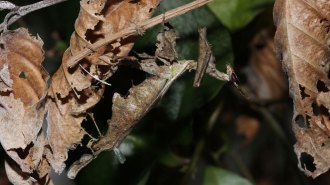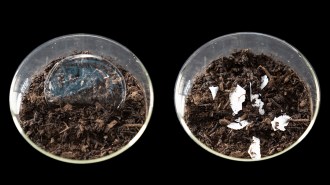Uncategorized
-
 Particle Physics
Particle PhysicsThe thickness of lead’s neutron ‘skin’ has been precisely measured
At 0.28 trillionths of a millimeter thick, the shell of neutrons around the nucleus of an atom of lead is a bit thicker than physicists had predicted.
-
 Health & Medicine
Health & MedicineCOVID-19 can affect the brain. New clues hint at how
Anxiety, depression and strokes can occur after infection, leaving experts to determine how the virus affects the brain.
-
 Space
SpaceStars made of antimatter could lurk in the Milky Way
Fourteen celestial sources of gamma rays provide preliminary hints of matter colliding with “antistars” in our galaxy.
-
 Animals
AnimalsThis praying mantis inflates a strange pheromone gland to lure mates
Researchers stumbled across a first among mantises: an inflatable organ that spreads pheromones, helping mates find each other in the dark rainforest.
By Jake Buehler -
 Health & Medicine
Health & MedicineFDA and CDC OK resuming J&J COVID-19 shots paused over rare clot concerns
The single-dose vaccine carries a low risk of rare blood clots in women under 50, but experts say its benefits outweigh that risk.
-
 Planetary Science
Planetary ScienceNASA’s Perseverance rover split CO2 to make breathable air on Mars
An oxygen-making experiment on Perseverance shows that astronauts will one day be able to make air to breathe and, better yet, rocket fuel.
-
 Health & Medicine
Health & MedicineExperts predict U.S. COVID-19 cases will dip in summer but surge in winter
Masks, vaccines and coronavirus variants could all affect how bad a predicted winter surge gets.
-
 Astronomy
AstronomyMysterious ‘yellowballs’ littering the Milky Way are clusters of newborn stars
The first comprehensive analysis of the celestial specks indicates they are clusters of infant stars of various masses.
-
 Health & Medicine
Health & MedicineCapturing the sense of touch could upgrade prosthetics and our digital lives
Haptics researchers are working on ways to add touch to virtual reality, online shopping, telemedicine and advanced artificial limbs.
-
 Physics
PhysicsX-ray scans explain how the ‘Brazil nut effect’ works
X-ray CT scans of a box of mixed nuts explain the orientations that let large, oblong Brazil nuts rise to the top.
-
 Space
SpaceFast radio bursts could help solve the mystery of the universe’s expansion
Astronomers used fast radio bursts for the first time to measure the Hubble constant in hopes of ending the debate on the universe’s expansion rate.
-
 Chemistry
ChemistryA new technique could make some plastic trash compostable at home
Embedding enzymes inside biodegradable plastics makes them truly compostable, which could mitigate the plastic waste problem.
By Carmen Drahl